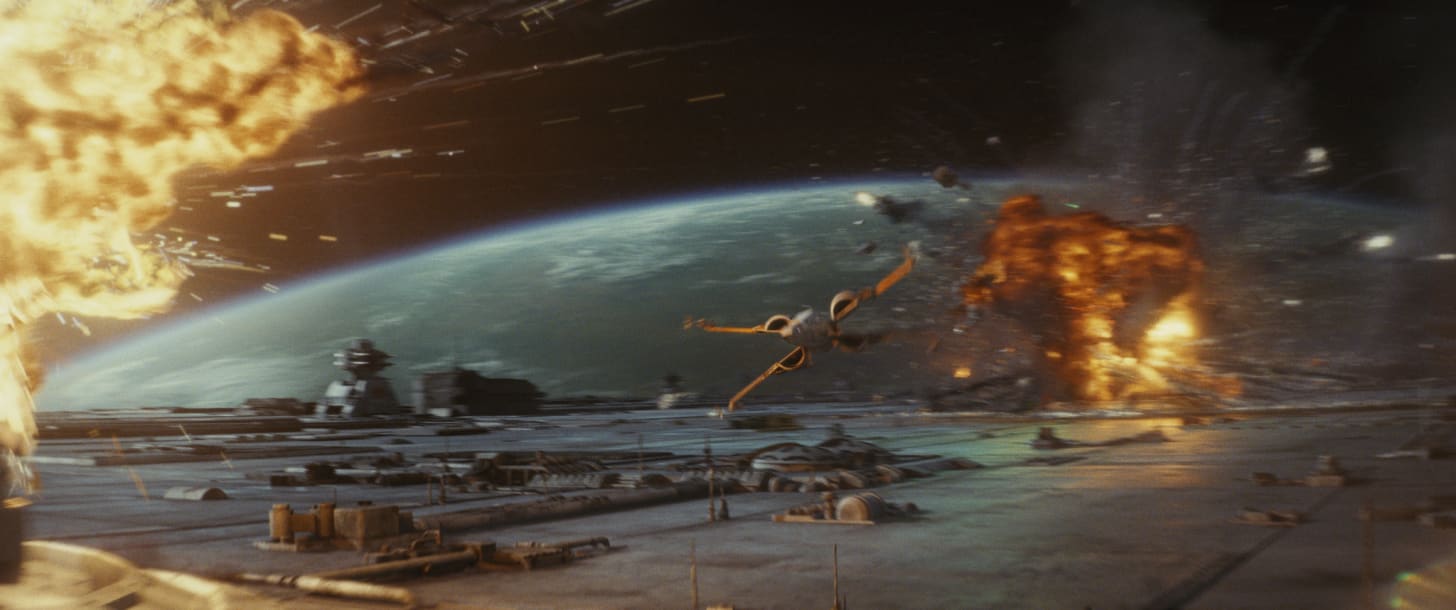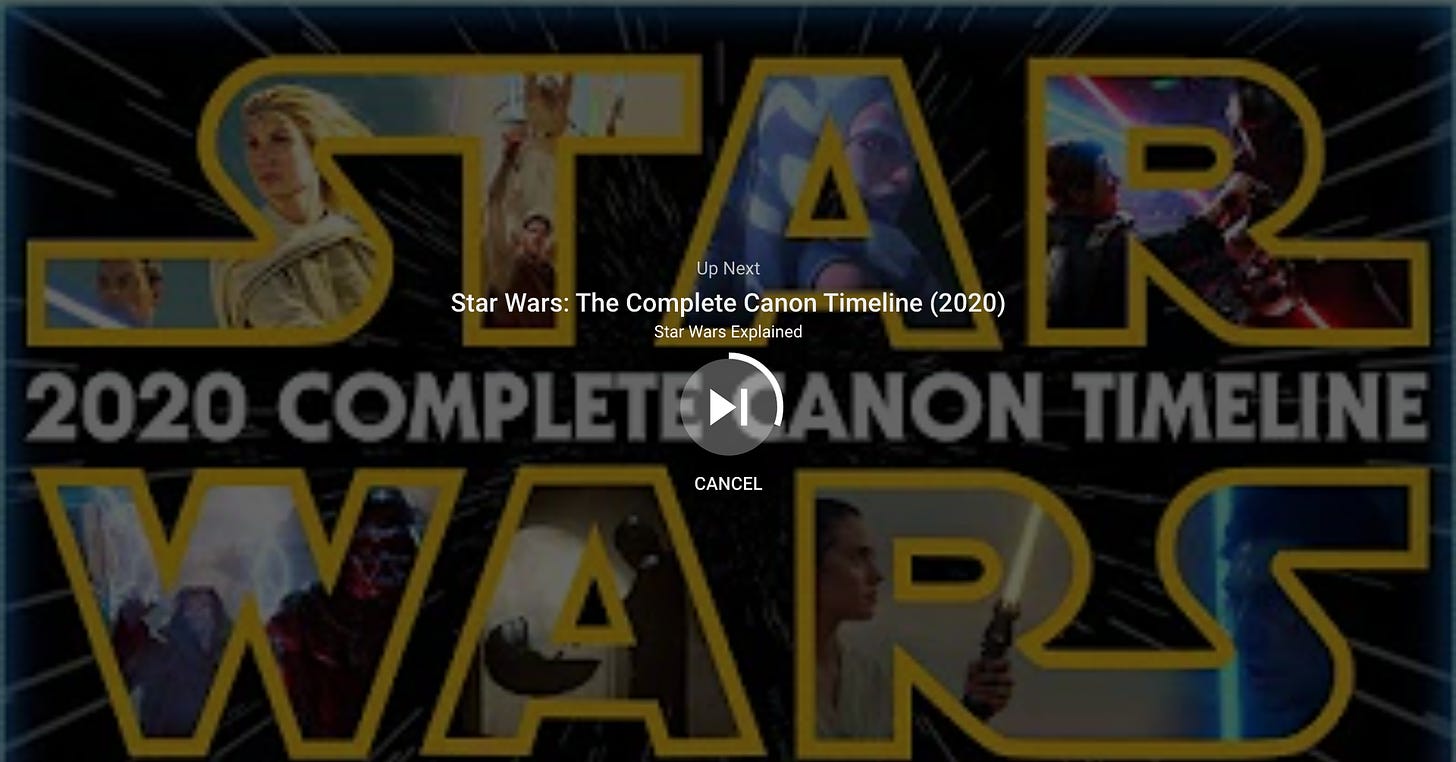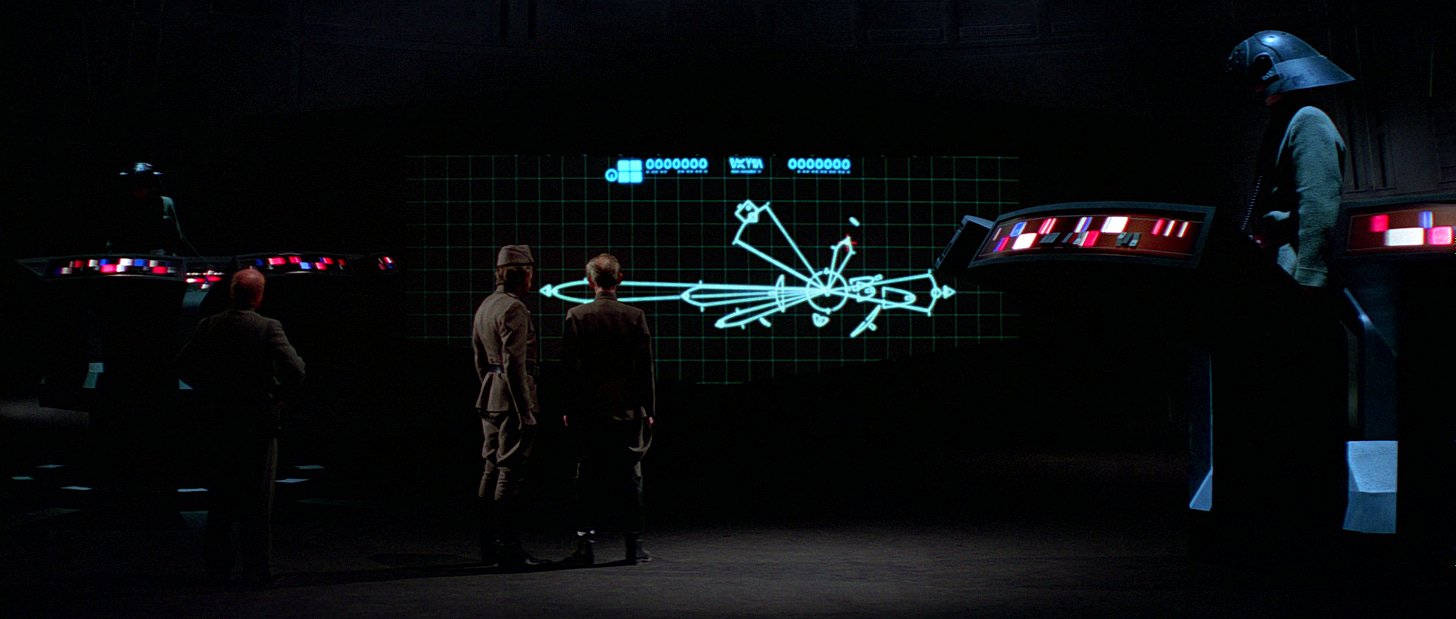"Qanon for nerds": Fandom isn't immune to online radicalization
Conspiracy theories and online fandom

A couple of months ago, I called up a friend to catch up and show off a book that I’d gotten in the mail, and as we’re wont to do, we ended up chatting about Star Wars. We don’t entirely see eye-to-eye on how the latest iteration of the franchise has turned out, and after he went through "the sequel trilogy took the wind out of my sails,” argument, things took a turn. “Kathleen Kennedy is doing this deliberately,” he said [I’m paraphrasing a bit]. “It’s like she wants the franchise to fail.”
I nodded to show that I was listening, but was astounded at what he’d said, and wondered where this was coming from — it was more extreme than what I’d heard before. He went on to run down a list of other complaints: about how George Lucas’s hand-picked successor at the film studio was not only directly responsible for the polarizing and “politically-correct” The Last Jedi, but that she made editorial decisions that eliminated characters and made The Rise of Skywalker an unwatchable mess, that entire sections of the film were reshot in the weeks ahead of the film’s release, and that because Disney was so unhappy with the film’s box office take, it was bringing back George Lucas to take control of the franchise once again. All things that are — to my knowledge, completely false.
All of this, he eventually told me, came from a YouTube channel that he admitted had a name with no credibility, but which he’d begun to watch constantly: Overlord DVD, which featured a masked narrator named Victor Von DoomCock.

Eight years ago, Disney surprised everyone by buying Lucasfilm and announcing its intention to bring Star Wars back to theaters with a brand new sequel trilogy. The news excited fans — a third trilogy was something that Lucas had long talked about, but had largely sworn off because of the reaction to the prequels.
And when J.J. Abrams’ The Force Awakens hit theaters in 2015, it was widely acclaimed for doing what the prequels didn’t: tell a story that was in the mold of the original three films, with a bit of a modern twist. I’ve maintained that he was the right and safe choice to relaunch the franchise: he’d built his career on setting up intriguing stories, delivering solid action, and was enough of a Star Wars fan that he understood what fans wanted. Most importantly, he didn’t push for something too far from fan expectations. That combination worked: the film blew away box office records, ultimately earning more than $2 billion at the global box office. Unadjusted for inflation, it’s the fourth-highest grossing film ever, after Avengers: Endgame, Avatar, and Titanic.
At their core, fans are passionate about the things that they love. There’s a bit of a truism within the Star Wars fan community: we can’t help but hate Star Wars. Long-term fans hated that Lucas went back and messed with the original trilogy in 1997 for the Special Editions. The New Jedi Order killed off Chewbacca and ruined Star Wars completely — and earned author R.A. Salvatore death threats. They hated Jar Jar Binks and the wonky and clumsy politics of The Phantom Menace. Lucas’s animated Clone Wars and pilot film was terrible and full of juvenile, irritating characters.
That mentality certainly extends beyond Star Wars. In their book, Superfandom: How Our Obsessions Are Changing What We Buy and Who We Are, Zoe Fraade-Blanar and Aaron M. Glazer note that there’s been a rise in what they call “Commercial Fandom” as companies and brands such as Polaroid, Old Spice or Coca-Cola have leaned into nostalgia and a sense of shared experience to market their products — something we’ve seen as studios work feverishly to resurrect old movie franchises for new audiences, like Blade Runner, The Terminator, Alien, Ghostbusters, Planet of the Apes, King Kong, Batman, Star Wars, Star Trek, and others. Some of those reboots, remakes, sidequels, and continuations have wildly succeeded: Planet of the Apes, while quietly successful, has earned acclaim for its take on the story concept. The same can be said for the likes of the SCI Fi Channel’s Battlestar Galactica, and Christopher Nolan’s Dark Knight trilogy. In other cases, like The Phantom Menace, The Terminator or Alien, the results have been more mixed: films that seriously fall short of their originating entries.
Fans took notice, and with the rise of social media, it’s easy for that collective sense of dismay to spread like wildfire. When Sony announced that it was rebooting the Ghostbusters franchise with Paul Feig and an all-female cast, the backlash was fairly immediate from fans who felt that it would replace the franchise that they already loved, but also from fans who had internalized outdated and harmful ideas about gender and representation.
As that film ramped up its marketing, so too did a widespread campaign against it, which pushed a couple of predictable talking points, before and after it hit theaters: ‘this isn’t my Ghostbusters,’ ‘I like all of the people, but it didn’t work for me,’ ‘It just wasn’t funny,’ and so forth. Online, the vitriol cranked up, pushed by bad-faith actors in the budding Alt-right movement, particularly Milo Yiannopoulos and Theodore Beale (Vox Day), directing harassment to everyone involved.
That harassment was quickly becoming an established norm online, and in 2014, Emma Carmichael wrote a piece for Deadspin about the influence of an online harassment movement known as Gamergate. She outlined how a small, vocal group of gamers can be influential if they really put their anger and keyboards to work, and that the movement represented a “fascinating glimpse of the future of grievance politics as they will be carried out by people who grew up online.”

We’ve seen that playbook play out again and again. As Lucasfilm ramped up its efforts in 2016 for its next Star Wars movie, Rogue One, rumors of behind-the-scenes drama began to surface. Lucasfilm wasn’t pleased with what they were seeing with its original director, Gareth Edwards, and began to undertake some extensive reshoots on the film with a new director, Tony Gilroy. Gilroy later called the film a “troubled mess.” By the time the film hit theaters, it was well-received by critics and fans — people again liked that it was a film that leaned into the look and feel of the original trilogy. But the cracks were beginning to show.
When The Last Jedi hit theaters, the fan community was immediately polarized. Some liked how it pushed against the franchise’s long-held tropes. Others hated it. They hated that it seemed to throw everything they loved into the garbage, porgs, seemingly new Force powers, Leia flying through space, bombs behaving as though they’re in gravity, and that there were women in prominent roles in it. Some of the film’s cast were forced off of social media because of relentless waves of online harassment. Fans traded theories about behind the scenes drama, and that key figures like Lucas or Jon Favreau hated the film.
The second standalone film, Solo, brought even more drastic behind-the-scenes drama: Lucasfilm fired directors Phil Lord and Christopher Miller midway through the production, and brought on Ron Howard to salvage the film. That, coupled with its release just months after The Last Jedi and lackluster box office receipts (just shy of $400 million), led to an abrupt change in Disney’s stance towards the franchise. A planned Boba Fett film was axed, and Disney CEO Bob Iger told The Hollywood Reporter that they tried too much, too quickly, and that fans should expect a slowdown.
Since its release in 2019, The Rise of Skywalker has been no less polarizing when it debuted in theaters. It had also seen a director fired from it, with Abrams brought on quickly to start over again, and it faced the tough job of wrapping up the entire, convoluted story that had come before it. The film further splintered the various factions of Star Wars fans out there. Some fans hated it for showing that Lucasfilm didn’t go into the trilogy with a cohesive plan, others hated how it seemed to undo choices from The Last Jedi, others took too much stock in rumors and fan-theories and were let down, and still others yet found some deeper meanings that tie the films together. Online, a new wave of conspiracy theories has emerged over the handling of the franchise.
Certainly, no film is perfect, and the Star Wars franchise — and Disney’s sequel trilogy — has its share of problems. But there’s a distinction between honest criticism and diving into the deep end of the pool.

Conspiracy theories have been with us for eons: a product of our brains liking to make connections to turn a complicated world into a story that’s easier to digest and comprehend. In a recent episode of WNYC’s On the Media, Republic of Lies: American Conspiracy Theorists and Their Surprising Rise to Power author Anna Merlan notes that they serve as a way to explain something that’s complicated, but in a way that lines up with the believer’s worldview.
Social media is particularly primed for this sort of mis/disinformation environment. We are social creatures, and platforms like Facebook, Instagram, Twitter, YouTube, and others, understand how to keep people engaged online, to keep them on their sites for longer and longer periods of time. It’s the passionate content that stirs emotions like joy and anger that keep you scrolling through your feeds, and generating a body of data that allows them to specifically target your interests with ads. Our brains are wired for this sort of activity, and we’re rewarded, chemically, for every like or notification that we get on our phones and tablets.
A couple of years ago, P.W. Singer and Emerson T. Brooking wrote LikeWar: The Weaponization of Social Media, an in-depth look at how various individuals, organizations, and state actors utilize social media platforms to manipulate users, and that conspiracy theories are a prime weapon that bad actors have used, especially in the run-up to the 2016 presidential election.
Because political and entertainment dis/misinformation campaigns take place online and often alongside one another, “the tactics are the same,” Singer explained to me via email. “ The same dynamics of everything from the algorithms to what draws attentions work, whatever the topic. It is the same reason that we saw ISIS copycatting Taylor Swift or Lady Gaga fans copycatting Russian info ops.”
Those tactics include a range of means to distribute bad-faith information from more obscure corners of the internet, all the way to mainstream news. In a simplified process, trolls, state actors, disgruntled fans, and shitposters churn through ideas on platforms such as 4Chan, which then percolates out into a wider pool of fans discussing those topics on places like Facebook, Instagram, Reddit, Twitter, or YouTube.
In many cases, those messages and theories are part of a much larger “alternative media” environment, and get picked up as news by networks of sympathetic “news” outlets. The political spectrum has sites like Breitbart or The Daily Caller, The Federalist, RedState, and others, while fandom has its own sources of “alternative news” — Cosmic Book News, Bounding in to Comics, We Got This Covered — covers their respective fields, but with an ideological slant that their followers share — often hitting stories off of established and reputable outlets while pushing back against the perceived influence of “social justice warriors” and an epidemic of “political correctness.”

As a platform, YouTube is particularly good at holding your attention, and it’s a prime tool for spreading one’s message, something that bad actors have been able to take advantage of. “The classic way that this happens is that YouTube incentivizes channels to maximize watch time,” Casey Newton, a former colleague and the writer behind the newsletter Platformer, told me. He’s spent years following the rise of social media and the impact that platforms have on the wider public, and has written extensively about how powerful these tools can be for people. These channels, he says, are “promoted by being watched for a long time, so [the] channels that have been successful are ones that lay out really compelling conspiracy theories abut the way the world operates.”
What’s scary is that this is a movement that’s “YouTube’s recommendations figure out over time that if you like this video, you might like that video. Someone who loves Star Wars will have YouTube’s algorithms recommend the Star Wars conspiracy theorists to them. It’s not a human decision, but a machine recommendation.”
“Innocuous searches can lead to being pushed by recommendations to more extreme views,” Newton explained, and suggested an experiment: open up YouTube in an incognito window, and watch the recommendations in action. Starting with a query for the Rise of Skywalker trailer, it ran through the other recent trailers and special looks (5), before sending me down a rabbithole of retrospectives and mashups of film footage from non-Lucasfilm creators (8). From there, it stopped autoplaying, so I selected another video essay, and ended up in a long stream of videos about fan theories and what ifs (11), before it sent me back to official channels like Disney XD. With a new search query about the ending of The Rise of Skywalker and another for The Last Jedi, I ended up in prime territory for the takedowns and far-out fan theories, with videos titled “Star Wars: The Rise of Skywalker: An Unbridled Rage,” “Rise of Skywalker: A Complete Cinematic Failure,” “It’s a Trap! Strong Women of Star Wars, It’s A Lie & Here’s The Proof",” and “Ghostbusters 2016 - Its As Bad As I Remember.”
It only took a couple of search queries and about 25 videos to reach that point, and these weren’t the really bad ones.
This is true for the world of science fiction fandom. In the years since Gamergate emerged, and throughout the last four years of the Trump Administration, we’ve seen the emergence of huge YouTube channels with hundreds of thousands of followers, each providing their own brand of commentary and takes on the world of Star Wars, Marvel, and other hot-button SF/F franchises, ready to unleash their opinions, scoops, or reviews upon their followers. I’ve seen friends get snagged into their arguments and worldview.
The case of Overlord DVD/Victor Von Doomcock is illustrative. The channel published its first video back in 2017 with a review of The Last Jedi’s trailer, and its early videos feature rack up only a couple of thousand hits. But over time, those views begin to climb, from the thousands into tens of thousands, largely focusing on Star Wars, Marvel, Star Trek, and other franchises. In those videos, the masked narrator rails against feminism and perceived SJW insults to their favorite franchises and stories, to the point where the channel’s latest videos have hit hundreds of thousands of views.
I reached out to the channel for an interview, but didn’t hear back.
The dynamics at work here are fairly clear, Newton explained, pointing to channel creators who have been incentivized to keep people watching their videos, but also to be attractive to the sharing algorithms, by creating content that’s more extreme and likely to elicit an emotional response from viewers. More viewers and subscribers means more views on the ads that run on the videos, and which results in more revenue for the channel. The more a channel creates and posts new content, the more they earn.
And the entertainment industry and fan outrage provides plenty of opportunities for new content. Looking over the titles of Overlord DVD’s videos, it’s easy to see the pipeline of misinformation from questionable sources on Twitter and the internet in action. They use their channel to highlight recent slights, couching their language in dramatic terms:
- “Star Trek Discovery Insults Gene Roddenberry | Ugliest Star Trek Scene EVER,”
- “Kathleen Kennedy At It Again | New Lucasfilm Movie Biased Against Police,”
- “Marvel Rumors | MCU Going M-She-U | Brie Larson OUT?”
- “Star Wars Mandalorian Star Gina Carano Attacked by Angry Twitter Mob”
- “Star Wars Disaster | Daisy Ridley Reveals Sequel Trilogy Had No Plan”
- “Star Wars Leak | Kennedy Ruined Star Wars to Punish Lucas Insider Claims”
The language that’s being used here are fairly common talking points and themes in the larger culture wars in the US and elsewhere around the world, and looking at them in a broader context, what’s happening within fandom is simply that conflict showing up in those online spaces.
Conspiracy theories often show up during times of social upheaval and change, something that the entertainment industry has been going through in recent decades as it adapts to new audiences, new tastes, and changing social norms. (Often, small inclusions of more women and actors from marginalized backgrounds.) As more women and authors/creators of color began winning awards and acclaim within the science fiction community, we see more resistance from fandom’s old guard, railing against the changes to the world they grew up within.
Over the course of this summer, there’s been a raft of new conspiracy theories and blatantly false stories that have popped up across various platforms, many of which have ended up on this particular YouTube channel and others: that the production of The Mandalorian’s second season was rife with problems and setbacks (because of interference from the likes of Kathleen Kennedy), that series stars Pedro Pascal had abruptly quit the franchise because he couldn’t take his helmet off, that George Lucas was returning to the franchise to wrest control from Kennedy to save the franchise, and that Jon Favreau or Kevin Feige were poised to take control of Lucasfilm from Kennedy. None of that has happened.
It’s like Qanon for nerds.
It doesn’t seem to matter that on their face, all of these rumors are ridiculous, and more often than not, these rumors turn out to be incorrect — I haven’t seen YouTubers or writers issue retractions or couch their language as their stories haven’t turned out to be true. As one Star Wars friend and commentator noted, it “honestly comes down to people just being dumb and gullible, and slightly smarter people (or at least more opportunistic) latching on and knowing that they’ll eat it up with a spoon. It’s like Qanon for nerds.”

Image: Lucasfilm
It’s easy to look at this situation and shrug it off, especially when you consider the wider context of what’s going on in the world. But as Emma Carmichael wrote in Deadspin, the connections between blowups in online spaces have a devastating impact in the real world. They foster a hostile and toxic environment for fans to navigate, particularly those from marginalized communities, and could even lead them to real harm. Throughout the entire Gamergate (as well as its smaller sibling, Sad/Rabid Puppies in the SF/F world) actors, authors, commentators, and other creators would find themselves at the end of an angry, online mob, to the point where some had to flee their homes after their private information was leaked online.
Beyond that, people who end up going down the rabbit hole of conspiracy theories can find themselves in other troubles. “The worrisome thing,” Singer explains, is that “once you go down one rabbit hole, you are statistically way more likely to get drawn into others, even if it seemingly has nothing to do with [the original one] — ie, Flat Earthers becoming antisemites.” Once you’ve accepted the message that you can’t trust the commonly-accepted version of reality, you’d likely to buy into the alternative versions that bad-faith actors are happy to supply to you.
That’s worrisome, especially given the rise of conspiracy theories like Qanon, which peddle a false narrative that Democrats are part of a much larger child sex-trafficking ring. It’s a ridiculous concept in and of itself, but once someone has immersed themselves in it, they’re far more susceptible to the arguments that fellow followers provide. “You adopt a worldview that weakens your defenses against bullshit,” Singer says. “Your mindset becomes one of envisioning hidden forces are at work and you are the hero who only sees the ‘truth’. Once you start thinking this way on a certain topic, other conspiracy theories build off it.”
People who get snared in the conspiracy theories about how SJWs are ruining their favorite film franchise are speaking a congruent set of arguments as the people who are decrying the widespread protests against racial inequity, who believe that election fraud is a common thing, or who believe that there's a deep-seated conspiracies that rail against “globalists.”
There is some light at the end of the tunnel. Some social media platforms have begun to take concrete actions against conspiracies and delusions like Qanon. “Youtube has done some things to reduce frequency and intensity, and have been looking at hate speech and Qanon.” Newton explained. Facebook and Twitter have taken drastic actions to limit the spread of hate speech — officially forbidding things like holocaust denial and other harmful, falsehoods.
But, “a conspiracy theory about Star Wars doesn’t necessarily reach their radar,” Newton said. Those embers are still hot, and primed to transform to meet the arguments and talking points of the next set of conspiracy theories. Platform creators, people within fandom and communities need to work to ensure that their environments are safe, that misinformation is countered where it appears, and that bad actors are discredited and removed.
Countering these sorts of stories is both easy and hard. But there are easy steps to take:
- Read articles in their entirety before you share.
- Be wary of sensationalism and things that elicit an emotional response.
- Think about the accuracy of the information that you consume. Go to the source whenever possible.
- Closely examine your social feeds and cut down on noise by muting, unfollowing, or blocking.
(WNYC’s On the Media also has this great bit of advice for breaking news.)
As for my friend, I’ve spoken with him about how I gather information as a journalist, to seek out trustworthy sources of information, and to be skeptical of things that seem outlandish. I don’t know whether or not my arguments convinced him, but I hope they’ll give him something to think about moving forward.
As always, thank you for reading. This has been a project that I’ve worked on for a couple of months, ever since that first conversation, and it’s a topic that’s particularly stuck in my head over the last few months and years. I hope things will get better.
I’ll be back tomorrow with a couple of reviews — stay tuned.
Andrew